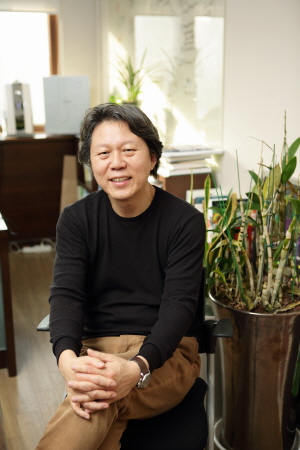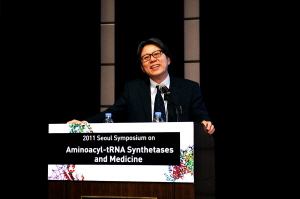A good doctor can save thousands of patients whereas an outstanding drug can save millions of patients. This is the philosophy of Professor KIM Sung Hoon of SNU’s Dept. of Molecular Medicine and Biopharmaceutical Sciences.

Professor KIM Sung Hoon
Although he was from a family of doctors that goes back generations, as a university student Kim decided to enter the College of Pharmacy at SNU.
Thirty-five years later, he is now conducting research on pharmaceuticals, especially on drug developing procedure.
With an average of 12 years production time involving more than 100 billion KRW, and an average success rate of 1 out of 10, the development of new drugs faces a tough reality. Korean drug companies have difficulties accessing a global drug market generally dominated by the US, European, and Japanese manufacturers. Professor Kim is carrying out research with the aim of helping Korean manufacturers to access the market. He is working on a new model for the development of new pharmaceuticals to replace the current drug manufacturing process, which usually involves big capital, a large labor force, and a high risk of failure. He wants to reduce the period from 12 years to 7.5-9 years, and reduce the cost to one-fifth of what it is at present, so that small Korean drug manufacturers may enter the market.
Professor Kim Sung Hoon is an established scientist. He started his research on protein synthase (an enzyme which makes up proteins) after he was appointed as a professor at Sungkyunkwan University in 1994. He discovered that it works as a control tower that can critically affect human biological phenomena when it was previously believed that this synthase had only a role in decoding genetic codes. He’s also known for discovering 9 new genes (including p18, p38, and p43), among which 7 are likely to have an impact on the anticancer drug market. For example, he found gene p18 which is responsible for anticancer mechanism, which was reported in the prestigious journal Cell in 2005. He also investigated a new mechanism of the gene responsible for a cancer outbreak last year. Through his wide-reaching and in-depth research, he is trying to find new drug targets, which is a key to the success of a drug. Considering the harsh reality of drug markets, he is now inventing a new automatic procedure for drug development which can reduce the time and effort required.

Professor Kim AT 2011 Seoul Symposium
The development of new pharmaceuticals consists of 4 steps: first, one needs to find genes or proteins (targets) that are responsible for specific diseases such as cancer. The second step is to collect components that can inhibit targets’ functions by binding them. Next, one should test the potentially harmful effects of those components through animal experiments. The last step is a clinical test with real patients.
Professor Kim is finding a scientific way to reduce the time spent in steps 1 through 3 from 6 years to 3 years, and possibly even to 1.5 years. KIM says, “Global manufacturers have a kind of conveyor belt system. The latter department should wait until the former finishes and passes on the work, and this is why it costs a lot. We need the process to become more like a high speed ‘expressway’.”
He suggests a ‘fusion development’ in which steps 1 through 3 are processed simultaneously. To do this, he is developing an automated technique with scientists from the fields of computer science, mechanics, electrical engineering, biology, physics, and chemistry. This involves structural analysis technique through the use of computers, super high speed analysis technique using nano technology, and micro fluid technique with a nail-sized chip which serves as a substitute for animal experiments. His ultimate dream is to automatize and integrate all the steps into one machine: a ‘drug vending machine’.
Professor Kim received his doctorate in Biology and Medicine from Brown University. He was awarded the Korea Science Award (2003) and Best Korean Scientist Award (2008), and was appointed leader of the ambitious Leading Creative Research Project at SNU. He has been leading the Medicinal Bioconvergence Research Center (Biocon) since 2011, supported by the government with an annual grant of 10 billion KRW (9,220,000 USD). Professor Kim is eager to produce a super-scale drug, a so-called “blockbuster”, which is able to compete in the 80 billion dollar market with his ‘new drug expressway’.
Written by KIM Hayoung, SNU English Editor, k1h2y3@snu.ac.kr
Reviewed by Eli Park Sorensen, SNU Professor of Liberal Studies, eps7257@snu.ac.kr
Proofread by Brett Johnson, SNU English Editor, morningcalm2@gmail.com

